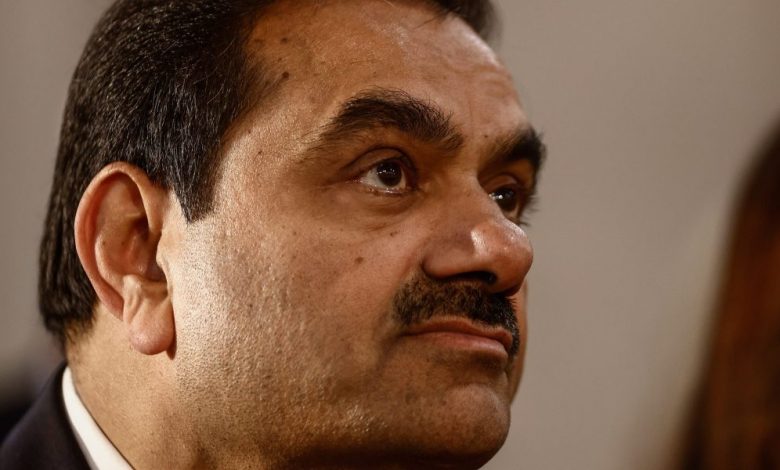ESG markets tremble as Adani Group loan agreements point to accidental funding of big polluters

Financing deals in the Adani Group conglomerate have brought a new chill to ESG markets as investors face a new risk.
Norway’s largest pension fund, KLP, recently divested its entire stake in Adani Green Energy Ltd, the renewable energy empire’s arm, amid fears it may have inadvertently helped fuel some of the world’s most polluting activities via the stake finance. A February 10 public filing has since made it clear that Adani is using shares in its green companies as collateral for a credit facility arranged through Adani Enterprises Ltd. helps finance the Carmichael coal mine in Australia.
KLP has blacklisted coal from its portfolio, so any indirect funding of the Carmichael project would be a “breach of our commitments,” Kiran Aziz, KLP’s head of responsible investing, said in an interview.
Since short seller Hindenburg Research published its critical report on Jan. 24, investors have responded to its allegations of fraud and market manipulation by selling Adani shares. But for investors with environmental, social, and governance mandates, there’s an added layer of pain when they realize their green dollars are indirectly backing the dirtiest fossil fuels.
“Investments in other parts of the Adani Group feed into Carmichael’s funding,” said Ulf Erlandsson, chief executive of the Anthropocene Fixed Income Institute, which Adani Group has pursued since mid-2020. “Investors constrained in financing greenfield coal mining should reconsider potential exposures across the Adani Group.”
According to data compiled by Bloomberg, more than 500 funds registered in the European Union as “promoters” of ESG goals hold Adani shares either directly or indirectly.
An Adani spokesman did not respond to a request for comment. The company has repeatedly denied the allegations in the Hindenburg report and threatened legal action.
AFII’s Erlandsson said that a stock investor pledging stock as collateral does not necessarily contaminate other stockholders. But the “high concentration of shareholdings and other interdependencies” in the Adani conglomerate pose an additional risk, he said. A higher price for Adani Green’s shares increases the value of the collateral and lowers the credit risk for SBI’s coal project funding, which then “hypothetically manifests itself as Bank Carmichael being able to offer a lower interest rate,” he said.
Adani Green’s share price has fallen nearly 70% this year, while its debt has also collapsed. The company said on Feb. 7 that it had garnered investor support after reporting third-quarter net income that more than doubled from a year earlier. Vneet S. Jaain, Adani Green’s CEO, said the results proved that the company had a “robust capital management program with leverage well matched to the business model.”
On February 16, it emerged that the conglomerate was in talks with potential investors to raise up to $1.5 billion through Adani Green note sales, Adani Transmission Ltd proceedings.
The Hindenburg Report found that “The companies of the Adani Group are interconnected and interdependent in complex and distinct ways. None of the companies listed is isolated from the performance or failures of the other group companies.”
The Carmichael coal mine, located inland from Australia’s famous Great Barrier Reef in Queensland, has become a lightning rod for climate activists because of the environmental degradation the facility represents. Headwinds also came from banks, insurers and investors, who were alarmed about the mine’s carbon footprint.
MSCI Inc. gives Adani Green an A rating and the company is included in several of its ESG and Climate indices. S&P Global Inc. announced this month that it was removing Adani Enterprises from its Dow Jones sustainability indexes. Sustainalytics has downgraded the ESG scores of several Adani companies. MSCI said it will begin reviewing ESG index holdings more frequently in response to questions about its approach.
Norway’s KLP, which has around 765 billion Norwegian kroner ($75 billion) under management, sold its position in Adani Green on January 30, adding five more Adani companies it had previously excluded from its investment universe.
“Adani’s corporate structure created an unacceptably high risk that ‘clean’ investments could be channeled into coal mining,” Aziz said.
The largest external owner of Adani Green is TotalEnergies SE, which acquired a 20% stake in 2021. The French energy giant confirmed its exit from coal production and marketing in 2015. CEO Patrick Pouyanne said earlier this month that Adani Green and Adani Total Gas Ltd., in which it has also invested, are “healthy” companies.
“TotalEnergies’ shares in AGEL are neither pledged nor used as security for financing or other projects,” said a company spokesman. “TotalEnergies is not involved in the use of shares held by other AGEL shareholders for security or other purposes.”
–Assisted by Gina Turner, PR Sanjai and Saikat Das.
Learn how to navigate and build trust in your organization with The Trust Factor, a weekly newsletter exploring what leaders need to succeed. Login here.



